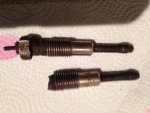A friend of mine who restores antique outboard motors ( with plenty of rusty and frozen fasteners ) is a firm believer in heating and cooling the nasty looking fasteners a few times before trying to unscrew them. He heats them up with a torch, then sprays them with ice water, then repeats... He also says he sometimes uses hydrogen peroxide ( yes, the stuff in your medicine cabinet ) instead of spray penetrants like PB blaster or WD40 and such. He sprays on the H2O2 and lets sit overnight. Personally, I just uses heat, spray penetrant, then more heat, let it air cool until no longer red and try to remove it and just keep an eye on what is happening. I prefer using a short (6") 3/8 drive ratchet instead of a longer wrench, torque wrench or ratchet, it will give you a better feel and help minimize the chance of applying too much force and snapping it off. If it moves a little then tightens up, apply some penetrant and screw it back in, then work it back and forth while adding penetrant oil.



